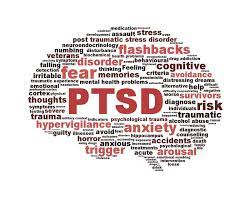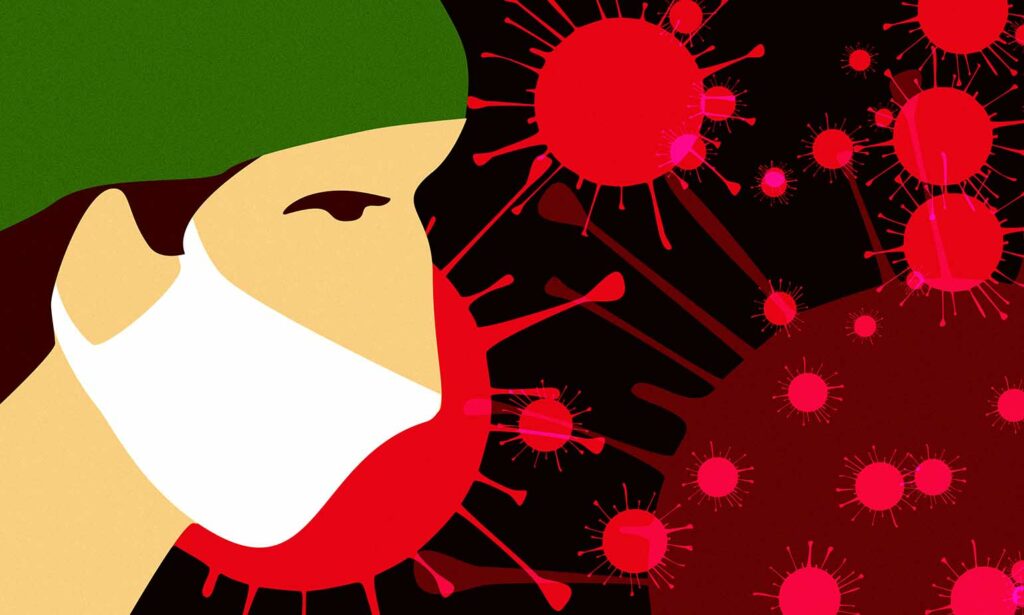Post-traumatic stress disorder, or PTSD, is a condition that can develop after someone has experienced a traumatic event. The symptoms of PTSD can be very disruptive and may significantly impair the person’s ability to function in everyday life. In this blog post, we will discuss what acute PTSD is, its associated symptoms, and how to deal with it.
Contents
What Is Acute PTSD?

Acute PTSD is a form of post-traumatic stress disorder that can occur immediately after a traumatic event. It is characterized by intense anxiety, flashbacks, and avoidance of anything that reminds the person of the trauma. Acute PTSD can last for weeks or months and may lead to chronic PTSD if not appropriately treated.
Symptoms
Acute PTSD can manifest in several ways, and the symptoms can vary from person to person. However, some common symptoms tend to be experienced by those suffering from this condition. These include:
Flashbacks
Intrusive memories or images of the traumatic event can come at any time and without warning. For instance, you may be going about your day-to-day activities when all of a sudden, you’re hit with a vivid memory of the trauma.
This can be extremely distressing and disruptive, as it can feel like you’re reliving the event all over again. Flashbacks can happen in both visual and auditory.
Nightmares
Re-experiencing the traumatic event in a distressing dream can cause insomnia and sleep disturbance. For instance, you may have intrusive thoughts during the day which can make concentrating difficult. You may also avoid people, places, or things that remind you of the traumatic event. This can make going to work or socializing difficult.
Intrusive thoughts
Memories of the trauma that feel like they’re happening again. These can include flashbacks, which are vivid re-experiences of the event. You may feel like you’re in danger or going through the trauma all over again.
Intrusive thoughts can be so severe that they interfere with your daily life and make it hard to go about your day-to-day activities. They can make you feel on edge, irritable, and jumpy. You might be constantly on the lookout for signs that the trauma is happening again.
Numbing
Feeling emotionally flat or detached from others, experiencing a loss of interest in activities that were previously enjoyed, and having difficulty experiencing positive emotions. For instance, you may not feel as close to your partner or friends, find that activities you once enjoyed are now uninteresting, or feel generally pessimistic about the future. For example, you may have intrusive memories, dreams, or flashbacks of the trauma, you may feel anxious and on edge; you may be easily irritated and angered, you may have difficulty sleeping, and you may avoid people or places that remind you of the traumatic event.
Avoidance
Actively avoiding people, places, thoughts, or situations that remind you of the traumatic event. For example, you may avoid going to certain places because they remind you of the trauma. You may also avoid talking about the event or thinking about it. For instance, someone who was in a car accident may avoid driving or even getting in a car. This can make it hard to go to work, run errands, or take care of responsibilities.
Avoidance can make it hard to go about your daily life and do the things you enjoy. It can also lead to feeling disconnected from other people. People who are avoiding may seem like they are “numb” or “not there.”
Hyperarousal
Hyperarousal is when you constantly feel on edge or suffer from insomnia and irritability. You may feel like you are in danger all the time, even when there is no threat. This can lead to feeling jumpy, being easily startled, and having trouble sleeping. You may also have angry outbursts or be easily irritated.
It can make it hard to concentrate or focus on anything other than the threat. You may feel like you need to be on constant guard, which can be exhausting.
Re-experiencing
Re-experiencing is when you have intrusive thoughts, flashbacks, and nightmares about the trauma. These can be so severe that you feel like you are going through the experience again. You may also feel emotional distress and physical reactions, such as a racing heart or sweating when something triggers your memories. For example, you may hear a car backfire and relive the trauma of being in a combat zone. The instance of re-experiencing can make it hard to go about your day-to-day life.
If you think you may be suffering from acute PTSD, please don’t hesitate to reach out for help. A qualified mental health professional will be able to assess your symptoms and provide you with the treatment and support you need to recover.
What Are The Causes Of Acute PTSD?
There are various causes of PTSD. They are as follows:
Age
- Adults over the age of 60 are the least likely to develop PTSD after a traumatic event
- Women are more likely than men to develop PTSD
- Children under the age of 12 may experience symptoms similar to PTSD, but they typically do not last as long or are not as intense as those experienced by adults.
Trauma
One of the risk factors for developing acute PTSD is a history of abuse or trauma. This could be physical, sexual, emotional, or any other type of trauma. If you have experienced any kind of abuse or trauma in your life.
The definition of multiple trauma is when a person experiences two or more traumatic events. This can happen suddenly, such as in the case of a car accident, or it can happen over time, like with exposure to domestic violence. Research has shown that people who experience multiple traumas are at an increased risk for developing PTSD. The more severe the trauma, the more likely you are to develop PTSD. This is why people who have experienced war or natural disasters are at a higher risk for developing acute PTSD.
A family history
Another risk factor for developing acute PTSD is a family history of mental health disorders. If you have a parent or sibling with a mental illness, you may be more likely to develop PTSD yourself. For instance, if you are a war veteran and have a parent who suffers from depression, your risk for developing PTSD may be higher than someone with no family history of mental illness. In addition to family history, being socially isolated can also put you at greater risk for acute PTSD. If you do not have many close friends or supportive relationships, you may be more prone to developing this condition.
Substance Abuse
PTSD and substance abuse often go hand-in-hand. This is because people who suffer from PTSD may turn to drugs or alcohol as a way to self-medicate. This can lead to a spiral effect, where the substance abuse leads to more trauma, which then leads to more substance abuse. If you or someone you know is struggling with PTSD and substance abuse, it’s important to get help from a professional.
Depression
PTSD and depression are also closely linked. This is because people who have PTSD may feel hopeless and helpless, which can lead to depression. If you or someone you know is struggling with PTSD and depression, it’s important to get help from a professional. The risk factor for developing acute PTSD is a personal history of mental health disorders. If you have any kind of mental illness, you may be more likely to develop PTSD after a traumatic event.
So these are the causes of acute PTSD which are important to be known.PTSD can cause a lot of problems in a person’s life, but it is important to remember that there is help available.
Treatment Options

Acute PTSD can be treated with various treatment options.
Medication
The most common type of medication used to treat PTSD is antidepressants. Antidepressants can help to relieve some of the symptoms of PTSD, such as depression, anxiety, and sleep problems.
Medicines include are :
- Selective serotonin reuptake inhibitors (SSRIs).
- Serotonin and norepinephrine reuptake inhibitors (SNRIs).
Examples of these are :
- Paroxetine (Paxil, Pexeva)
- Fluoxetine (Prozac, Sarafem)
- Sertraline (Zoloft)
- Venlafaxine (Effexor XR)
- Desvenlafaxine (Pristiq)
Therapy
Different types of therapy can be used to treat PTSD. They are:
Cognitive behavioral therapy: It can also be very helpful in treating PTSD. Different types of therapy can be used to treat PTSD. The most common type of therapy is cognitive behavioral therapy (CBT) can help you to change the way you think about your trauma and help you to cope with your symptoms. CBT involves gradually exposing yourself to the things that trigger your PTSD symptoms in a safe and controlled environment. This can help you learn to manage your symptoms and reactions. It is a type of therapy that can help you identify and change negative thinking patterns and behaviors that are keeping you from recovery.
Eye movement desensitization and reprocessing (EMDR): It is another type of therapy that can be used to treat PTSD. EMDR can help you to process your trauma and to reduce your symptoms.
For example, you might be asked to think about your trauma while the therapist moves their fingers back and forth in front of your eyes.
EMDR is an effective treatment for PTSD, and it can help you to feel better. If you are interested in trying EMDR, you should talk to your doctor or mental health professional.
Join Support groups
They can provide you with social and emotional support. For example, you can:
- Talk about your experiences with others who have been through similar trauma
- Learn helpful coping strategies
- Share tips for managing triggers and flashbacks
- Build a support network of people who understand what you’re going through.
It’s important to remember that everyone experiences trauma and PTSD differently. There is no “right” way to recover. Some people find that medication, therapy, and support groups help manage their symptoms. Others find that they don’t need any formal treatment and can recover on their own with the support of friends and family. However, if you choose to recover, know that there is hope and help available.
Conclusion
It may be concluded that acute PTSD is a serious psychological condition that can have debilitating effects on an individual. It is important to seek professional help if you or someone you know is suffering from this disorder. With proper treatment, however, many people with acute PTSD can lead normal, productive lives.
For further information and suggestions, please contact Therapy Mantra. We have a team of expert therapists and psychiatrists that can help you overcome this problem. Get in touch with us right away to learn more about our services. You may also make an online therapy session or download our free Android or iOS app.


